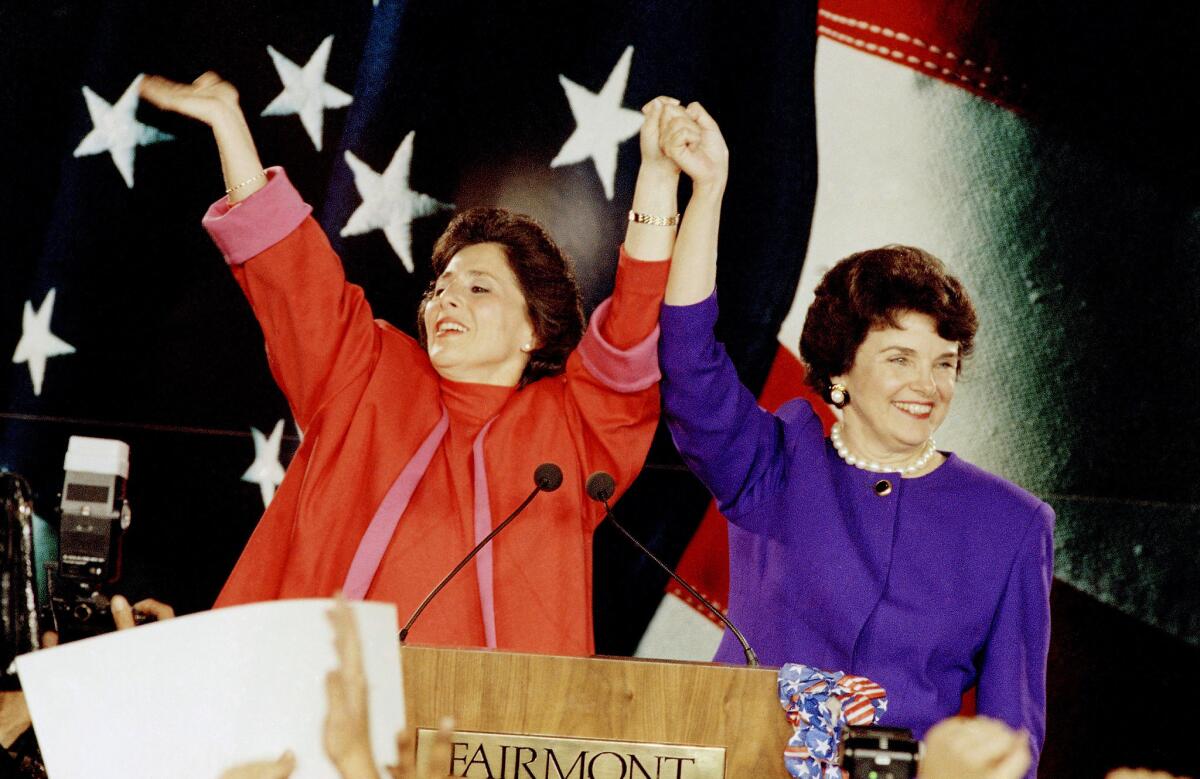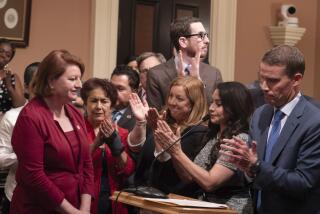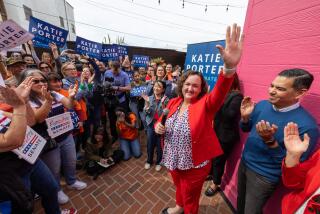After 24 years working together, Feinstein and Boxer say goodbye to their ‘Thelma and Louise’ partnership
In 1992, Dianne Feinstein and Barbara Boxer pitched themselves to California voters as the dynamic duo, as “Thelma and Louise,” as “Cagney and Lacey.”
They were trying to convince voters to do something no state had ever done: Elect two women to represent them in the U.S. Senate.
When they got to Washington, reporters followed the pair, looking for signs of discord. Boxer and Feinstein derided the attention as bizarre and sexist, but they remained conscious of the intense interest in how the nation’s first female pair of senators would work together.
“It was ridiculous,” Boxer said. “We knew there were people who were ready to say two women can’t get along. We knew we had that responsibility.”
Their different personalities — and governing styles — could have posed a problem. Instead, their contrasts, in many cases, became a strength.
Feinstein, a former mayor of San Francisco, was a consensus builder willing to buck her own party at times to reach a compromise. Boxer, who served 10 years in the House before coming to the Senate, was a bit of a flamethrower, more rigidly ideological and staunchly devoted to the environment and women’s healthcare.
“They are fire and ice,” USC political scientist Dan Schnur said. “They’ve been almost perfect complements to each other.”
The 76-year-old Boxer is retiring in January, leaving behind a 24-year working relationship with Feinstein that was by all appearances in sync until its last days, when an argument over water policy played out in public.
Starting Jan. 3, Feinstein will have a new partner in Kamala Harris, who has a blend of Boxer’s progressive ideology and Feinstein’s pragmatism.
“It’s hard to predict how she and Feinstein will work together, but it’s reasonable to assume they will end up being an even better combination,” Schnur said.

It’s common for rivalries to develop between senators from the same state, especially if they are from the same party. But Feinstein, the moderate policy wonk, and Boxer, the progressive rabble-rouser, carved their own niches, built their own alliances and largely avoided conflict.
Feinstein, a senior member of the Appropriations Committee, Judiciary Committee and Select Intelligence Committee, took the lead on spending and foreign policy issues. Boxer, the ranking Democrat on the Environment and Public Works Committee and a senior member of the Select Ethics Committee and the Foreign Relations Committee, focused on the environment, women’s rights and consumer issues.
Those different interests allowed them to go their own ways, Feinstein recalled, but they almost always backed each other’s legislation.
They put up a united front for California, together trying to limit helicopter noise over Los Angeles neighborhoods, advance a long-stalled federal courthouse project in downtown L.A. and strengthen flood protection in the Sacramento area.
They’ve worked in tandem on infrastructure, Lake Tahoe restoration, protecting wilderness areas and preventing offshore drilling.
Their different interests and relationships allowed them to reach out to a broad swath of their Senate colleagues when petitioning for something California needed. They were so effective at cajoling their counterparts on the Golden State’s behalf that President Clinton once called them a “one-two punch.”
They campaigned against automatic guns, for a desert protection bill and for disaster relief after earthquakes, fires and floods.
When they differed, such as on their votes on the Iraq War and some of the George W. Bush tax cuts, it was quietly. (Boxer was against them; Feinstein was for them.)
“We are friends, and we supported each other,” Feinstein said. “It just naturally happened.”
Whether they were actually friends, or just two powerful women who saw the political benefit of getting along publicly, has been a source of speculation for years.
“There’s never been much sense of a strong personal relationship between the two,” Schnur said. “They teamed up when it was necessary, but for the most part, seem to have decided to stay out of the others’ way.”
The senators and their husbands have shared meals, but only rarely, over the years, Boxer said. But they always took time to chat about their children when they’d run into each other in the Capitol.
“I would call it a warm relationship,” Boxer said.
Asked for a memory that stuck out from working with Boxer, Feinstein instead praised Boxer’s well-known energy: “You see that when she speaks, and you see that when she moves.” Feinstein added that Boxer accomplished a lot with her time on the Environment and Public Works Committee.
Boxer has long said she is indebted to Feinstein, who, at some political risk to herself, abandoned the final days of her 1992 campaign schedule to work on Boxer’s behalf when Boxer’s Republican foe had a late surge in the polls.
That was when the “Thelma and Louise” comparisons began. As Feinstein herself put it at an October 1992 rally: “Just as Cagney had Lacey and Thelma had Louise, Dianne has Barbara and Barbara has Dianne.
“She stood by my side, even though it could have cost her votes. And I will never, ever forget that,” Boxer said in her farewell speech on the Senate floor.
It was the only time Boxer mentioned Feinstein in the December speech. Feinstein wasn’t there, though Boxer said she didn’t notice. (Feinstein’s staff said her busy schedule in the final week of the session kept her from attending the speech.)
On the last day of the Senate’s session, when Feinstein rose from the floor in support of the water bill that had caused so much tension between them, she praised her colleague.
“No one has fought for California or for this country harder,” Feinstein said.
Earlier in the week, House Majority Leader Kevin McCarthy (R-Bakersfield) had — with Feinstein’s support — inserted language into a water infrastructure bill that Boxer had championed. The language increased how much water would be pumped from the Sacramento-San Joaquin Delta to San Joaquin Valley farmers and Southern California.
Boxer was apoplectic. She believed that an increase in water flows out of the Delta could ultimately threaten the Endangered Species Act.
Though she’d spent years negotiating the California water provision with delegation Republicans and a handful of Democrats, Feinstein had repeatedly refused to sign on unless Boxer was on board.
A problem ‘too big to ignore’ — how years of congressional wrangling led to a water compromise »
So Feinstein’s sudden willingness to support additions to Boxer’s bill — a bill Boxer had spent years negotiating — in her final days as a senator seemed like a disloyal twist of the knife.
Boxer spent days desperately trying to kill her own bill. But in the hours she spent railing on the Senate floor, she blamed McCarthy and never directly criticized Feinstein.
As the days, then the final hours, ticked by, Boxer seemed more resigned to the reality that her final vote as a U.S. senator would be against a bill she loved and that the senator who had been her longest and most-devoted ally had signed off on it.
As the votes were counted, she approached Feinstein and touched her elbow, interrupting her conversation. They hugged and found an empty row of wooden chairs to sit and talk.
Boxer said they agreed to set their disagreement aside, and spoke instead about their disappointment in the presidential election and about Feinstein’s preparations for nomination fights as the ranking Democrat on the Judiciary Committee.
Both said the water bill disagreement won’t affect their friendship.
“I try to bifurcate work and personal,” Boxer said. “But it is sad for me; it is heartbreaking for me. It’s the way life goes.”
“We just happened to have one issue out of a multitude of issues to have a different view [on],” Feinstein said. “I don’t think that’s too bad in 24 years.”
Follow @sarahdwire on Twitter
Read more about the 55 members of California’s delegation at latimes.com/politics
ALSO:
A problem ‘too big to ignore’ — how years of congressional wrangling led to a water compromise
The artist and the senator: One built a desert masterpiece, the other a Nevada legacy
Updates on California politics
More to Read
Get the L.A. Times Politics newsletter
Deeply reported insights into legislation, politics and policy from Sacramento, Washington and beyond. In your inbox three times per week.
You may occasionally receive promotional content from the Los Angeles Times.







